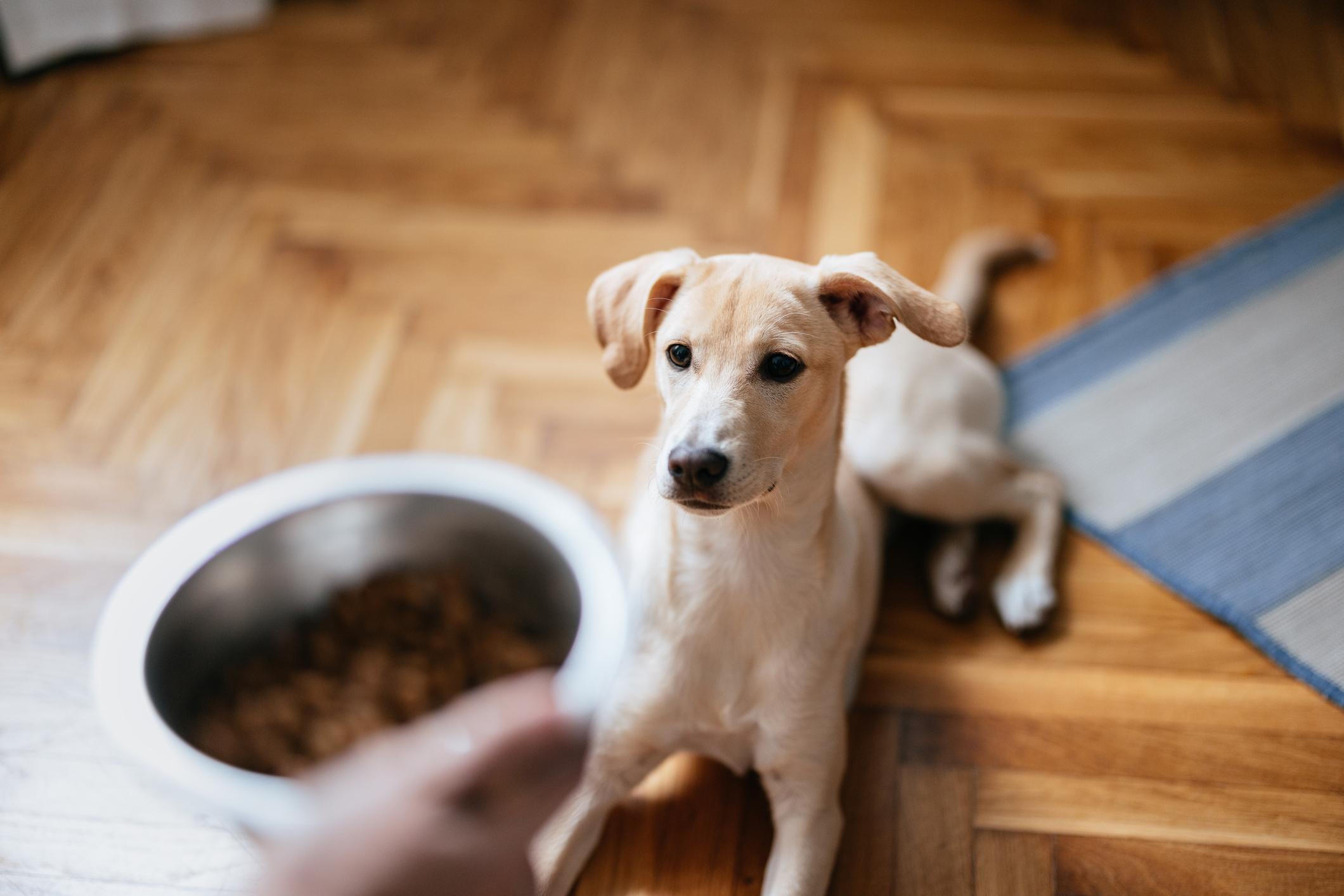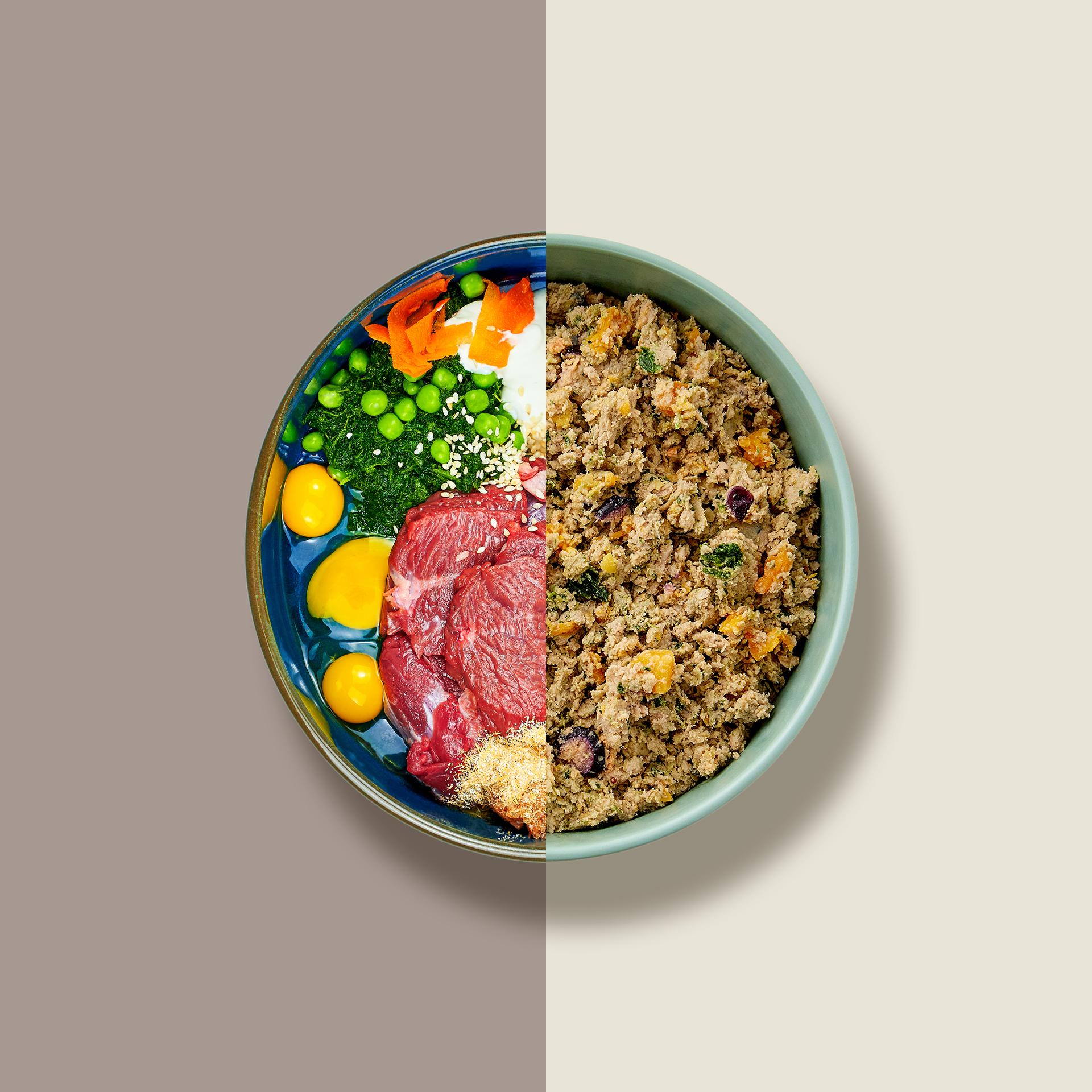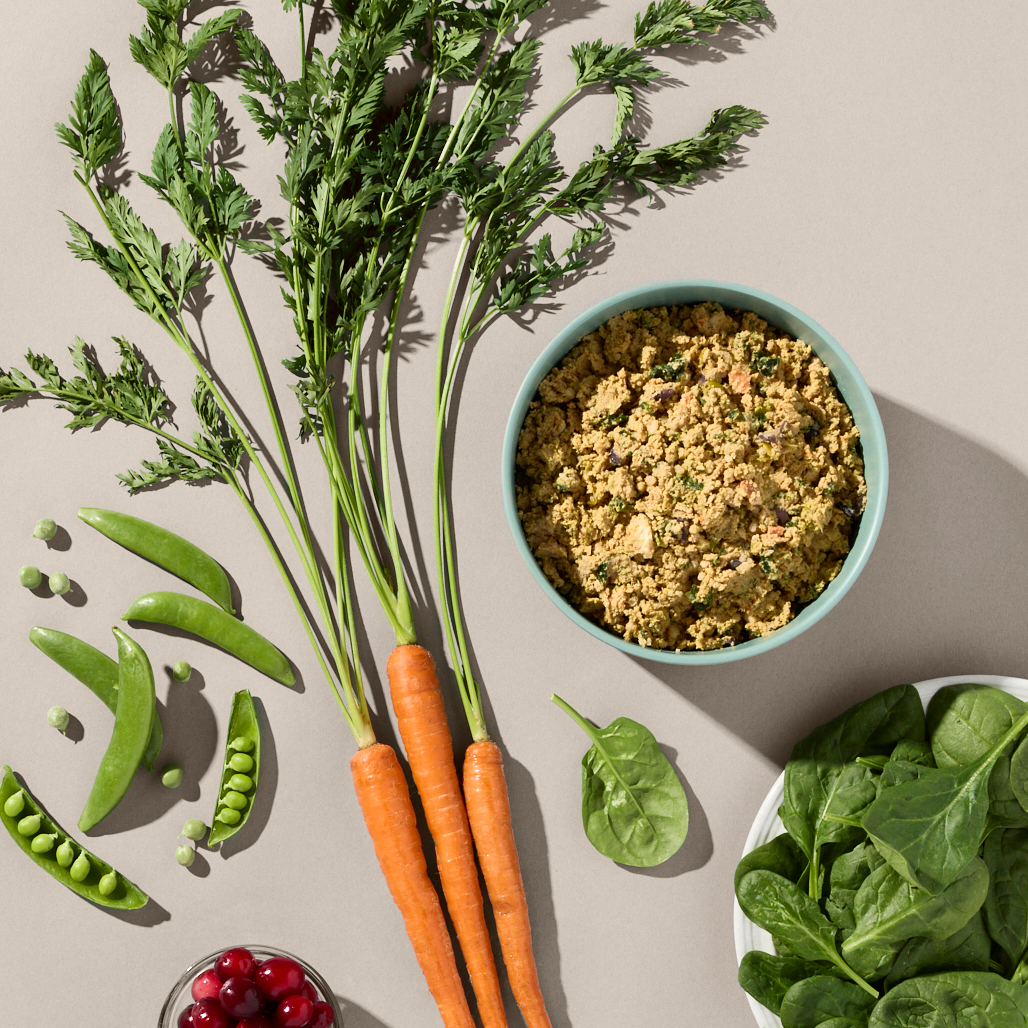Hey Ollie blog readers! We’re offering you an exclusive 60% OFF your starter box! Try now!
You might love yogurt for its delicious tang and gut-healthy probiotic boost, but what about as a treat to share with your best friend! We looked at all the reasons you might consider adding this delicious treat to your dog’s diet. Learn more about when and how you can share this cool, creamy treat.
Can Dogs Eat Yogurt?
Yes, dogs can eat yogurt, but there are some important factors to consider. Yogurt contains probiotics, which can support digestive health, and it’s also a good source of calcium and protein. However, not all dogs can tolerate dairy, and some types of yogurt contain added ingredients that may be harmful.
Dogs that are lactose intolerant may experience digestive issues like gas, bloating, or diarrhea after eating yogurt. Additionally, flavored yogurts often contain artificial sweeteners like xylitol, which is highly toxic to dogs. Always check the ingredient list before offering yogurt to your pup.
If your dog tolerates dairy well, plain, unsweetened yogurt can be a healthy occasional treat. Moderation is key, and it’s always best to introduce new foods gradually to see how your dog reacts.
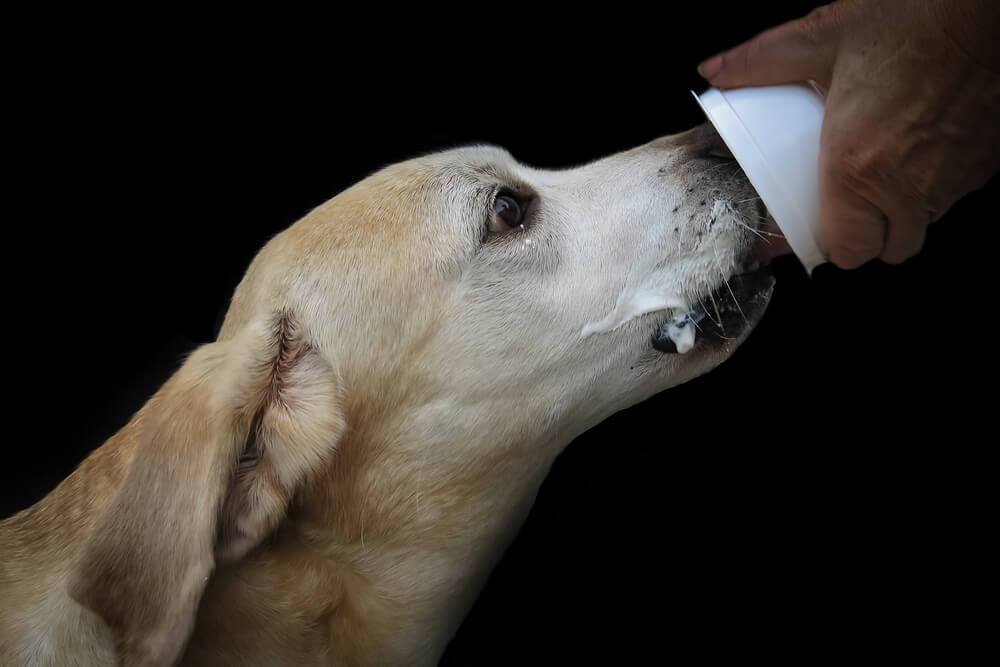
Health Benefits of Yogurt for Dogs
Yes, yogurt can be very beneficial for your dog. It is high in protein, which can help your pup feel full. It also is a good source of calcium which keeps your pup’s bones healthy. And finally, it is full of probiotics which are great for your dog’s digestive system. Even if yogurt is not a regular part of your dog’s diet, you might want to consider adding it if your dog has had surgery recently or is taking antibiotics. Since antibiotics kill bacteria, yogurt can help your pup get back (or maintain) some of the good bacteria in their gut.
Another benefit of yogurt is that it can be used to hide medication. If your dog is hiding from a pill, consider mixing it into some yogurt. Your pup may eat the pill in the yogurt so that you don’t have to keep chasing them around the house begging them to take their medicine (we know you do it and we know they don’t care)!
Here are some of the key benefits of feeding yogurt to dogs:
1. Supports Digestive Health
Yogurt contains probiotics, which are beneficial bacteria that help maintain a balanced gut microbiome. These probiotics can aid digestion, improve nutrient absorption, and support dogs with minor digestive issues such as occasional diarrhea or constipation.
2. Provides a Source of Protein
Protein is essential for muscle growth, repair, and overall energy levels. Greek yogurt, in particular, is higher in protein than regular yogurt, making it a good choice for active or growing dogs.
3. Strengthens Bones and Teeth
Yogurt is rich in calcium and phosphorus, two minerals that support strong bones and teeth. This is especially beneficial for puppies in their growth stages and senior dogs who may be prone to bone-related issues like arthritis.
4. Boosts the Immune System
The probiotics in yogurt may help strengthen the immune system by promoting healthy gut bacteria. A well-balanced gut microbiome is linked to better immune function, helping dogs fight off infections and illnesses more effectively.
5. Aids in Recovery After Antibiotics
If your dog has been on antibiotics, their gut bacteria may be disrupted, leading to digestive issues. Adding small amounts of probiotic-rich yogurt to their diet can help restore healthy bacteria and support recovery.
6. May Help with Skin and Coat Health
The nutrients in yogurt, including zinc and B vitamins, can contribute to healthy skin and a shiny coat. While yogurt alone isn’t a cure for skin conditions, it can be part of a well-balanced diet that supports skin health.
4 Tips for feeding your dog yogurt
1. Use plain yogurt
Flavored yogurts can be high in sugar which can lead to weight gain or obesity. You might be wondering if greek yogurt is okay to share – and it should be just fine for your pup to enjoy.
To avoid extra sugar, choose plain yogurt (regular or greek) without any flavors or sweetener. You can always add your own if your pup is put off by the tart flavor. Consider using honey or fresh fruit like strawberries or blueberries if the plain yogurt is unappealing to your dog. While a lick from your carton of flavored yogurt once in a while won’t be a problem, don’t ever offer your dog chocolate yogurt as you should never share chocolate with your dog.
2. Avoid low fat or diet yogurts
Try to use yogurt that is plain and as minimally processed as possible. Low fat or diet yogurts sometimes contain artificial sweeteners like aspartame or xylitol which are toxic to dogs. If you do use low-fat yogurt, ensure it is free from any artificial sweeteners before you share it with your pup.
3. Start slowly
If your pup has never had yogurt before, start with a small taste and work up from there. This will allow you to watch for lactose intolerance or any other allergic reaction your dog might have. Some pups also just have sensitive stomachs and any change in their diets, no matter how delicious can cause some stress and an upset stomach.
4. Use yogurt to make a delicious treat
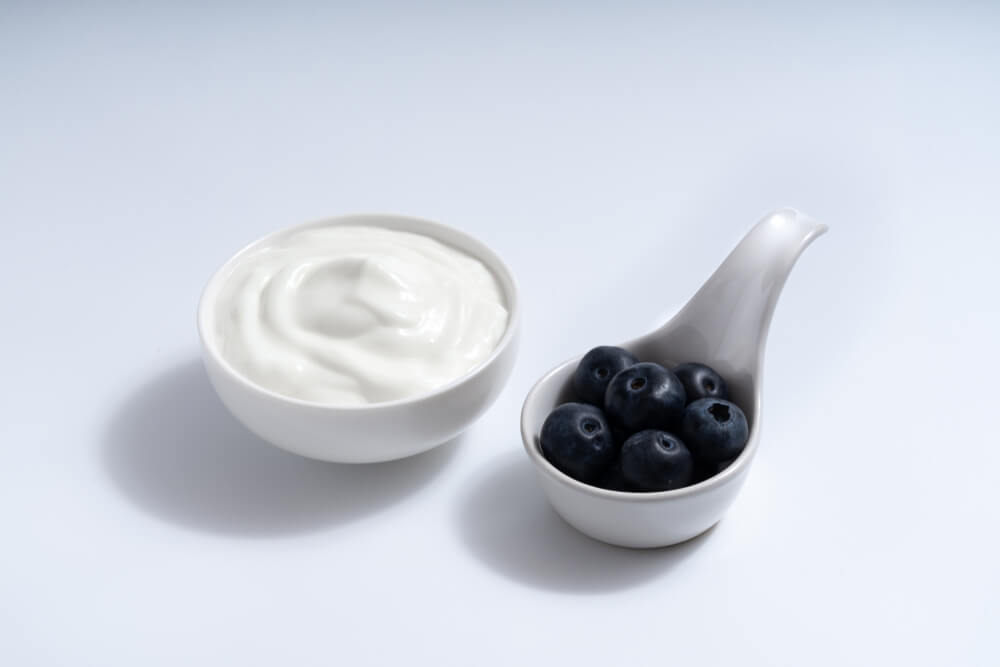
While sharing some plain yogurt with your pup can be a delicious treat by itself. You can also blend the yogurt with fruit and/or peanut butter and freeze it into a pupsicle. Your pup may love the added flavor boost as well as a cold treat on a warm day. Consider purchasing some fun molds in the shape of a heart, bone or paw print for an extra special treat!
Are There Any Risks for Dogs Eating Yogurt?
While yogurt can be a nutritious treat, there are some risks to consider:
- Lactose Intolerance – Many dogs have trouble digesting dairy products, which can lead to stomach upset, gas, or diarrhea.
- Added Sugars and Artificial Sweeteners – Flavored yogurts often contain sugar or xylitol, which can be dangerous for dogs. Xylitol, in particular, can cause rapid drops in blood sugar, seizures, and even liver failure.
- High-Fat Content – Some yogurts, especially full-fat varieties, may contribute to weight gain or trigger pancreatitis, a serious inflammatory condition.
- Digestive Upset from Probiotics – While probiotics in yogurt can be beneficial, too much can disrupt your dog’s digestive system, leading to loose stools.
To avoid these risks, always choose a plain, unsweetened yogurt without additives and introduce it in small amounts. If your dog shows any signs of discomfort after eating yogurt, discontinue feeding it and consult your veterinarian.
What Kind of Yogurt Is Safe for Dogs?
Not all yogurts are created equal, and some types are better suited for dogs than others. Here’s what to look for:
- Plain, Unsweetened Yogurt – Avoid flavored yogurts that contain added sugars or artificial sweeteners like xylitol.
- Low-Fat or Non-Fat Yogurt – Full-fat yogurt can be high in calories and may contribute to weight gain or digestive issues.
- Greek Yogurt – This type of yogurt is often a better choice for dogs because it contains less lactose and more protein than regular yogurt.
- Probiotic Yogurt – Some yogurts contain live, active cultures that support gut health, but make sure they don’t have added sugar or artificial ingredients.
Avoid yogurts with fruit mix-ins, artificial flavors, or added chocolate, as these can be harmful to dogs. When in doubt, check the ingredient list to ensure it contains only milk and live cultures.
How Much Yogurt Can Dogs Eat?
While yogurt can be a healthy snack, it should only be given in moderation. The right amount depends on your dog’s size, tolerance, and dietary needs.
- Small dogs (under 20 lbs): 1-2 teaspoons per serving
- Medium dogs (20-50 lbs): 1-2 tablespoons per serving
- Large dogs (50+ lbs): Up to ¼ cup per serving
Yogurt should be an occasional treat, not a daily staple. It’s best to introduce it gradually to see how your dog reacts. If they tolerate it well, you can offer it once or twice a week.
For dogs with sensitive stomachs, consider mixing a small amount of yogurt into their regular food instead of feeding it on its own. If your dog experiences any digestive upset, discontinue feeding yogurt and consult your veterinarian.
How can I tell if my pup is lactose intolerant?
Since your pup can’t tell you they’re having trouble with the lactose in yogurt, you will need to watch for some symptoms. If you see that your pups has diarrhea, vomiting or gas after eating yogurt, that is probably a pretty good sign they aren’t tolerating lactose. It could also be your pup’s way of showing that they have simply had too much yogurt or that the yogurt you gave them was bad. The signs and symptoms of mild food poisoning can be very similar to those of lactose intolerance. If your dog generally tolerates small amounts of dairy and they get sick one time, it could be food poisoning instead of lactose intolerance. Follow food safety guidelines and keep yogurt refrigerated as directed. Be mindful of expiration dates. Also, watch for any cross-contamination with other foods in your kitchen. Keep yourself and your pet safe as food poisoning is no fun for anyone – no one likes cleaning up vomit or diarrhea or watching their pet not feel well. You may have to give your pup yogurt a few times to tell if it is lactose intolerance or something else.
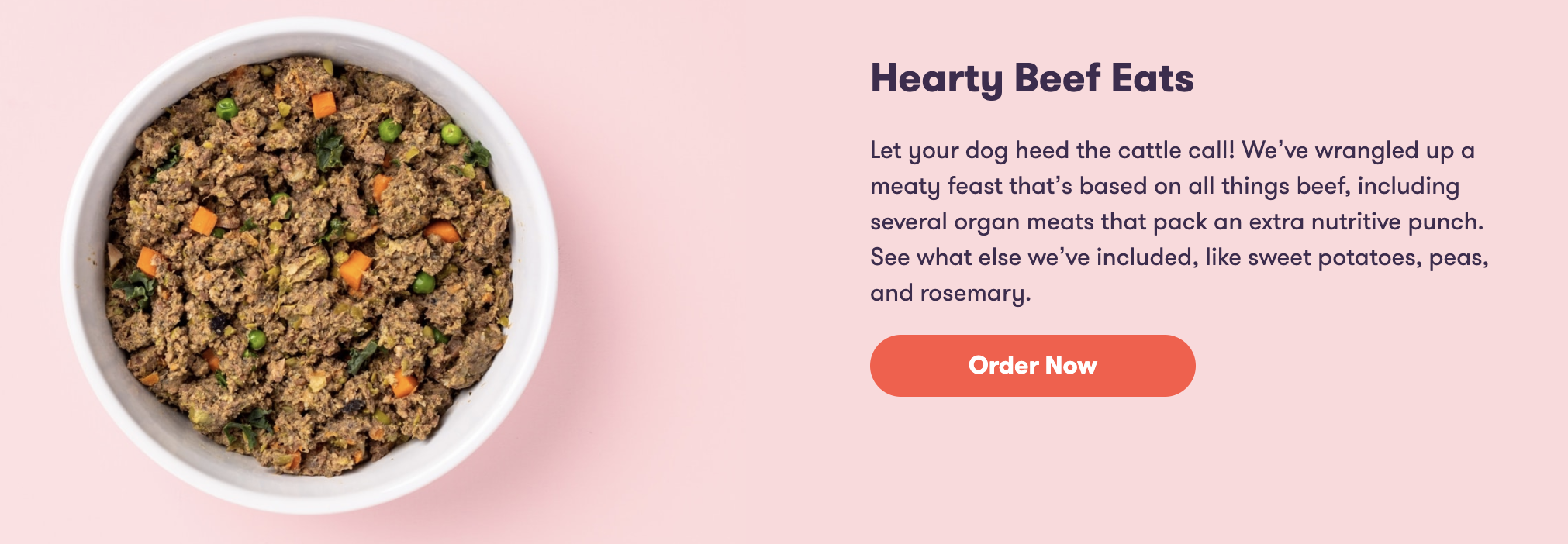
Before you share yogurt with your pup, it is a good idea to consult your vet to determine how much your pup can eat in a single serving. You can start slowly and work up to the ideal serving over the course of 3-7 days. If your pup has any adverse reaction to yogurt, stop feeding it and consult your vet again. Your vet may suggest you stop feeding yogurt and consider other sources of calcium, probiotics, and protein.
The Ollie blog is devoted to helping pet parents lead healthier lives with their pups. If you want to learn more about our fresh, human-grade food, check out MyOllie.com.
Tagged As:

The nutrition your dog needs,
the food they want.

Enjoying our articles? Subscribe our Newsletters and get new articles directly to your inbox
You might also like
12 August 2025
5 MINS READ
Top 8 Allergens Hiding in Your Dog’s Bowl
As pup parents, we never want to see our dogs uncomfortable. When it comes to itching, swelling, and upset stomachs, the culprit may be in their bowl. Understanding the most common allergens and t…
by Ollie Pets
12 August 2025
5 MINS READ
Raw vs. Gently Cooked: Which Is Ideal for Your Pup?
As more pup parents seek the best fresh dog food for their companions, they may find themselves choosing between a raw diet and a fresh diet. While cases have been made for both options, let’s exa…
by Ollie Pets
12 August 2025
5 MINS READ
Why Human-Grade Ingredients Matter for Your Dog
A healthier, happier dog starts with the right food. That said, knowing which diet is best for your pup can be overwhelming at times. Understanding what human-grade means, why it matters, and how …
by Ollie Pets





